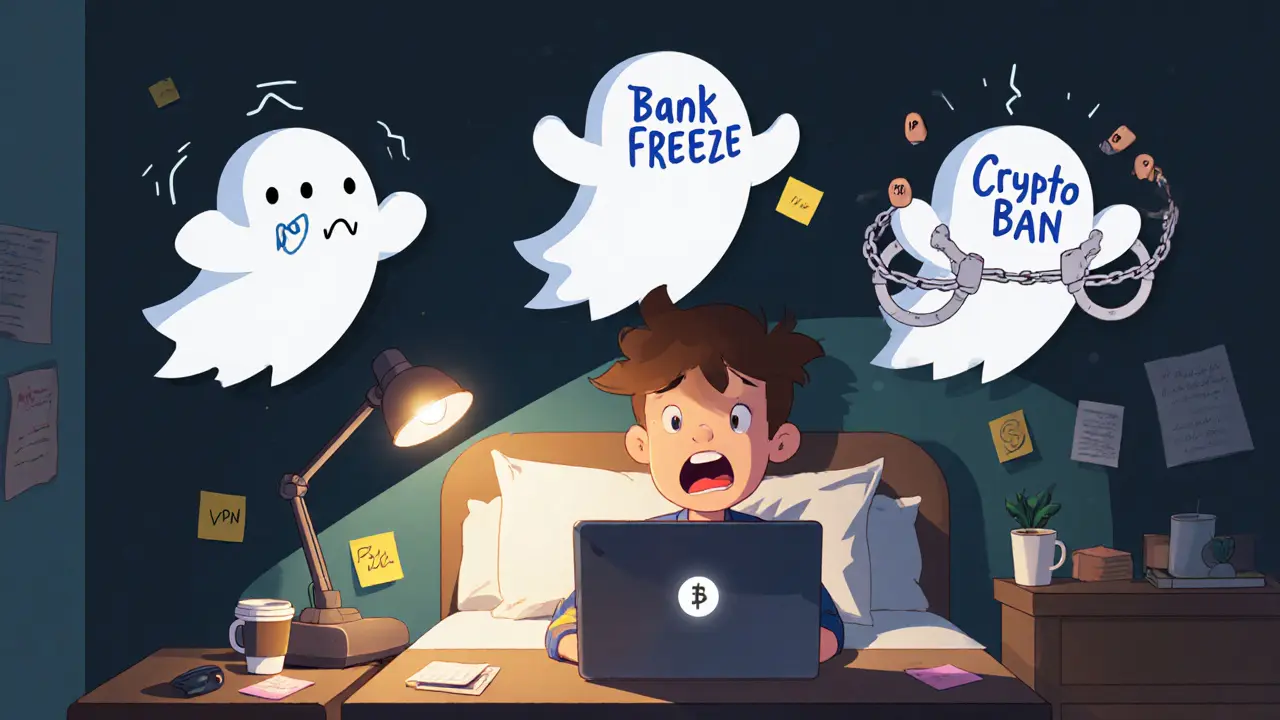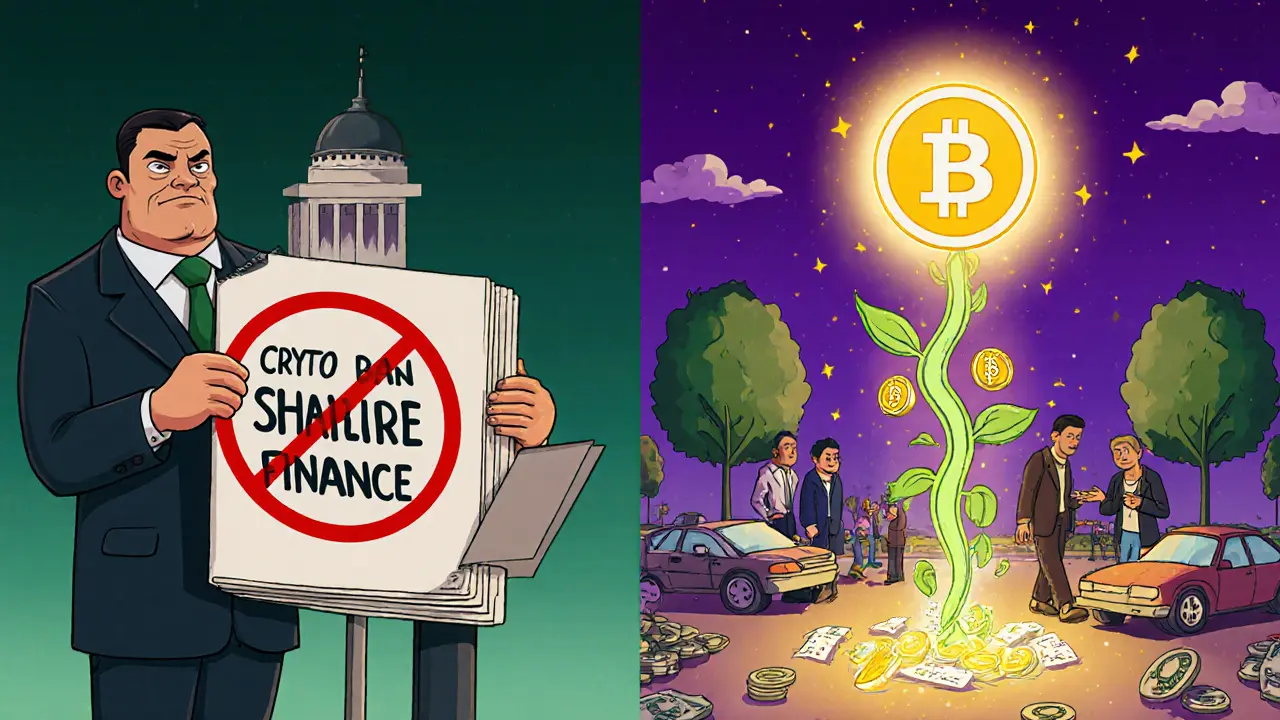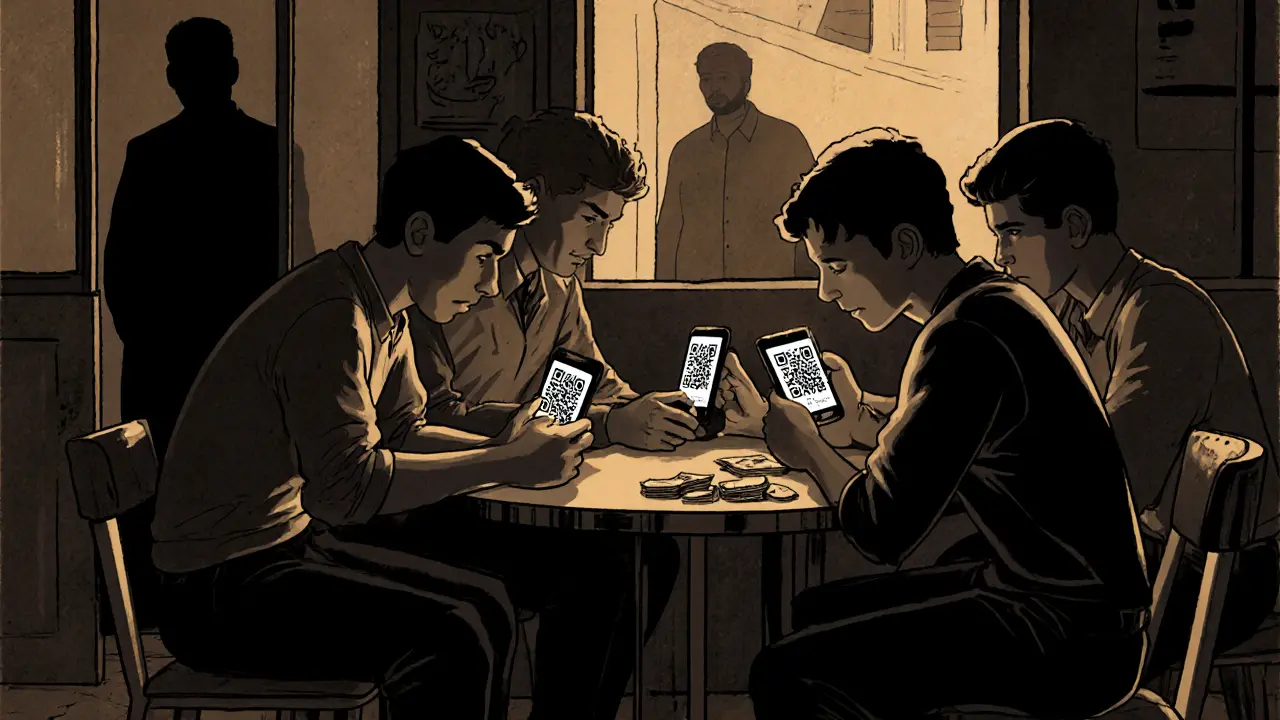Crypto Value Calculator for Tunisian Traders
How USDT Preserves Value in Tunisia
According to the article, 68% of underground crypto traders in Tunisia hold USDT as their primary asset. This calculator shows how USDT maintains value against Tunisia's high inflation rate (currently 5.2% annually) compared to holding cash in Tunisian Dinars.
On paper, cryptocurrency is illegal in Tunisia. Since May 2018, the Central Bank of Tunisia (BCT) has banned all crypto transactions-buying, selling, exchanging, even holding digital coins can land you in legal trouble. But if you walk through the streets of Tunis, Sousse, or Gabès, you’ll find hundreds of young people quietly trading Bitcoin, Ethereum, and USDT on their phones, using VPNs to hide their activity from government monitors. The ban didn’t stop crypto. It just pushed it underground.
How Tunisians Bypass the Crypto Ban
There are no licensed crypto exchanges in Tunisia. No Binance, no Coinbase, no local platforms. But that hasn’t stopped people from trading. Instead, they use peer-to-peer (P2P) platforms like Binance P2P and LocalBitcoins. These platforms connect buyers and sellers directly. No central server. No bank involvement. Just two people, one digital coin, and a cash exchange. To access these sites, Tunisians rely on VPNs. The government blocks crypto-related websites, but a good VPN bypasses those restrictions easily. Most traders use free or low-cost services like Windscribe or ProtonVPN. Some even set up their own private servers. Once connected, they log into P2P platforms, search for sellers offering USDT in Tunisian Dinars (TND), and arrange a meeting. Cash is king here. Because Tunisian banks automatically freeze any account linked to crypto activity, traders can’t deposit or withdraw money through traditional channels. So they meet in cafés, parks, or even parking lots. One person hands over cash. The other sends crypto instantly. No receipts. No bank records. Just a quick scan of a QR code and a handshake. Bitcoin and Ethereum are popular, but USDT-Tether-is the real workhorse. It’s stable, pegged to the U.S. dollar, and easy to move across borders. For Tunisians facing inflation and currency devaluation, USDT acts like a digital savings account. A 2023 survey by a local tech group found that 68% of underground traders held USDT as their primary asset, not because they believed in crypto speculation, but because it was the only way to preserve value.The Legal Risks Are Real
The government doesn’t joke about this. In 2021, a 17-year-old boy was arrested for running a small crypto exchange from his bedroom. He had only 12 customers, mostly friends. He spent six months in jail before being released without charges. But the message was clear: even small-scale trading is seen as a crime. Banks now have automated systems that flag transactions linked to crypto. If you send money to a known P2P trader’s account, your account gets frozen. The bank calls you in for questioning. You’re asked to prove the money came from a legal source-like a salary or business income. If you can’t, you risk losing access to your own money for months. The law doesn’t just punish traders. It punishes anyone who helps them. If you’re a shop owner who accepts crypto payments-even as a favor-you could be charged with money laundering. The legal framework treats crypto like a weapon of financial crime, not a technology. And yet, enforcement is inconsistent. In some cases, police ignore it. In others, they raid homes based on anonymous tips. The lack of clear guidelines means traders live in constant uncertainty. One day, your account is fine. The next, it’s frozen. No warning. No explanation.Why the Government Can’t Stop It
The BCT claims the ban is about protecting citizens from fraud and financial instability. But there’s a deeper reason: Islamic finance rules. Tunisia’s banking system follows Sharia principles, which prohibit interest-based transactions. Many crypto traders use lending platforms that pay interest on holdings-something the state sees as religiously forbidden. But the ban has backfired. Instead of reducing crypto use, it created a black market that’s harder to control. Traders are smarter now. They know how to avoid detection. They use burner phones, encrypted messaging apps like Signal, and cash-only deals. They don’t leave digital footprints. Even more ironic? The government is building its own blockchain system. Poste Tunisienne, the national postal service, is testing blockchain-based payment solutions for remittances and public services. The Central Bank is researching a Central Bank Digital Currency (CBDC). So while citizens are jailed for trading Bitcoin, the state is quietly developing its own version of digital money. This contradiction isn’t lost on Tunisians. Many ask: If the government can build a digital currency, why is it illegal for us to use Bitcoin?
The Brain Drain Effect
The crypto ban isn’t just hurting individuals-it’s hurting Tunisia’s economy. Every year, dozens of young tech entrepreneurs leave. They move to Canada, Switzerland, Portugal, or Georgia, where crypto is legal and supported. These aren’t just traders. They’re developers, blockchain engineers, fintech founders. One startup founder, Amine, built a DeFi platform for Tunisian farmers to get microloans using crypto collateral. He got a grant from a European tech fund. But when he tried to open a bank account in Tunisia to receive the funds, his application was denied. He moved to Lisbon last year. His company now employs 12 people-all outside Tunisia. The World Bank estimates that over 2,000 tech professionals have left Tunisia since 2019 because of the crypto ban. That’s not just lost talent. It’s lost innovation. Lost investment. Lost tax revenue. Some stay and adapt. Instead of trading crypto, they build blockchain tools for agriculture, logistics, or public records-areas that don’t trigger the ban. One group in Sfax created a blockchain-based system to track olive oil supply chains. It’s legal. It’s useful. And it’s growing.Change Is Coming-But When?
There are signs the government is reconsidering. In early 2025, a parliamentary committee drafted a bill to decriminalize cryptocurrency possession and create a licensing system for P2P platforms. The draft would allow regulated exchanges, require KYC checks, and impose taxes on profits. The Central Bank has signaled openness. It’s held meetings with fintech startups. It’s exploring partnerships with international regulators. But progress is slow. The conservative wing of the government still sees crypto as a threat to financial order. The religious establishment still opposes interest-based systems. For now, the underground market keeps growing. Estimates suggest over 150,000 Tunisians actively trade crypto. That’s nearly 1.5% of the population. And it’s mostly under 35. The question isn’t whether crypto will return to Tunisia. It’s when. And whether the government will be ready to regulate it-or just keep chasing ghosts in the digital shadows.
What Traders Need to Know Right Now
If you’re trading crypto in Tunisia, here’s what you need to remember:- Never link your bank account to crypto transactions. Use cash only.
- Use a reliable VPN. Free ones can leak your IP. Stick to ProtonVPN, Windscribe, or Mullvad.
- Stick to USDT. It’s the most stable and easiest to trade for cash.
- Meet in public places. Never trade at home. Record the transaction with a voice note-just in case.
- Don’t use your real name on P2P platforms. Use a pseudonym.
- Keep records of cash deals. If your account is frozen, you’ll need proof it wasn’t crypto-related.
Frequently Asked Questions
Is it illegal to own cryptocurrency in Tunisia?
Yes. Under Tunisian law, holding, buying, selling, or exchanging cryptocurrency is prohibited. The Central Bank of Tunisia banned all crypto transactions in May 2018. While possession alone hasn’t always led to arrests, any activity-like transferring coins or trading for cash-can trigger legal action.
Can I use Binance in Tunisia?
You can access Binance P2P through a VPN, but it’s against the law. Binance itself doesn’t block Tunisian users, but using it to trade crypto for Tunisian Dinars violates the BCT ban. Many Tunisians use Binance P2P because it’s the most reliable platform for cash trades. But doing so puts you at legal risk.
Why do Tunisians use USDT instead of Bitcoin?
USDT (Tether) is pegged to the U.S. dollar, so its value doesn’t swing like Bitcoin. For Tunisians dealing with inflation and a weakening dinar, USDT acts like a stable digital savings tool. It’s also easier to trade for cash quickly, and most P2P sellers prefer it because it’s less volatile.
What happens if my bank account gets frozen?
If your bank flags a crypto-related transaction, your account will be frozen while they investigate. You’ll need to prove the money came from a legal source-like your salary, business income, or family support. If you can’t, the freeze can last months. Some people lose access to their life savings during this process.
Is there a chance Tunisia will legalize crypto?
Yes. A draft bill introduced in early 2025 proposes decriminalizing crypto possession and creating a licensing system for P2P platforms. The Central Bank is also researching a digital currency. While no timeline exists, growing pressure from youth and tech communities makes regulation more likely than continued prohibition.
Can I get in trouble for using a VPN to access crypto sites?
Using a VPN itself isn’t illegal in Tunisia. But if authorities link your VPN use to crypto trading, you can be investigated for violating the crypto ban. The VPN isn’t the crime-it’s what you do with it. Many traders use VPNs daily for other reasons, so enforcement focuses on transaction patterns, not just the tool.

10 Comments
Man, this is wild. I knew crypto was big in some places, but never thought about Tunisia like this. It’s insane how people just adapt-cash meets QR code in a park like it’s a street market. The fact that USDT is their go-to because it’s stable? That’s just smart survival. I wish more governments saw tech like this as a tool, not a threat.
Oh please. These people are just glorified money launderers with a VPN and a coffee shop meetup. Calling it ‘financial innovation’ is like calling a potato a smartphone because you drew a screen on it. The government’s right to ban this chaos. If you want to be a crypto bro, move to Switzerland and stop pretending your park deals are revolutionary.
My soul just wept reading this. 😭 The sheer poetic tragedy of young Tunisians risking jail to hold digital gold while the state builds its own blockchain like a hypocritical god. I mean… are we watching a documentary or a Shakespearean tragedy set in a Starbucks? I need a glass of wine and a nap after this.
Really interesting read. The part about the olive oil supply chain in Sfax is the quiet hero here. It’s not flashy, but it’s real. Tech doesn’t have to be about speculation to be powerful. Maybe the future isn’t in bypassing the ban-but in building something the state can’t ignore because it’s too useful to shut down.
Okay so like… I’ve been thinking about this for like 3 days now and it’s just… wow. Like, if the government is building a CBDC but jailing people for using Bitcoin… isn’t that like… if you’re a chef and you ban everyone from using salt but then you make your own super salty soup? Like, why? Why not just let people use the thing that works? Also I think the word is ‘decentralized’ not ‘decentrilized’? Or is it? Idk. I’m just a guy with a laptop and a dream. But also… what if crypto is just… the new religion? Like, people need to believe in something that isn’t broken. And the dinar is broken. So they believe in USDT. And that’s kinda beautiful? Or is it dumb? I don’t know. I’m confused. But also… I think I want to move to Tunisia now. Just to meet a guy who trades crypto in a parking lot. 🤔
THIS IS THE END OF CIVILIZATION AS WE KNOW IT. 😭 The government is SLEEPING while young minds build a digital underground… and I… I feel it in my bones. This isn’t just about money. This is about FREEDOM. About CHOICE. About the SOUL of a generation that refuses to be silenced by outdated laws. My heart aches. My eyes fill with tears. I’ve lost sleep over this. I’ve written poems. I’ve cried into my oat milk latte. Someone… someone please help these brave souls. Or at least send them a care package. With USB drives. And emotional support.
The real irony isn’t the ban-it’s the cognitive dissonance of a state that criminalizes decentralized finance while building its own centralized digital currency. The BCT isn’t protecting financial stability; it’s protecting its own monopoly. Crypto’s appeal isn’t speculative-it’s existential. When a currency loses value and institutions lose trust, people turn to systems that don’t require permission. The government’s response is not just ineffective-it’s philosophically bankrupt. The real question is whether authority can evolve, or whether it will be outpaced by its own contradictions.
So… the ban is illegal? But also not? And USDT is stable? But not really? And VPNs are fine? Unless they’re not? And the government’s building a blockchain? But only for itself? And 150k people are trading? But only if they don’t get caught? And the draft bill? But no timeline? And the brain drain? But some stay and make olive oil blockchains? So… what’s the point? I’m confused. And also… why are we talking about this? It’s Tuesday. I need coffee.
Bro… this is so deep man. Like… we are all just atoms in a quantum universe trying to find meaning in a system built by old men in suits. Crypto is just the new prayer. USDT is the new holy water. And the VPN? That’s our spiritual shield against the demons of centralization. I feel it in my third eye. The state fears what it cannot control. But the youth? They are the light. I’ve been trading crypto since 2017 in Delhi and I know… this is the future. Even if I get arrested. Even if I lose my phone. Even if my mom says I’m wasting my life. I still believe. 🙏🔥
It’s fascinating how the ban created this quiet, decentralized ecosystem that’s more resilient than any bank. People aren’t just breaking rules-they’re designing alternatives without permission. The fact that they’re using cash and Signal and burner phones… it’s like a low-tech rebellion. And the olive oil blockchain? That’s the real win. It doesn’t fight the system. It just ignores it and builds something better. I wonder how many other places are doing this without us noticing. Maybe we’re all just waiting for the right moment to build our own version of this.